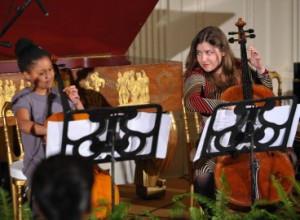
A blogger with The Washington Post followed up on yesterday’s performance at the White House, commenting that the presidential exposure and attitude towards classical music is encouraging. A White House spokesperson said the event won’t be the last to feature classical music, and those in attendance noticed how the President seemed very involved in the performances.
While the press did not have access to the masterclasses conducted by world class musicians including Sharon Isbin and Joshua Bell, they were allowed to hear the two performances of the day as well as Mrs. Obama’s remarks. Click to read the perspectives of the Washington Post and Baltimore Sun.
If you missed our last article on the event, read it here.
Author Archive
Classical Is In The (White) House
Roof Not Yet On Fire
Juilliard Acquires Beethoven and Mendelssohn Manuscripts
Musicians Discouraged from Bringing Pencils
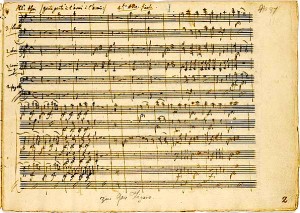
To mark the completion of a $200 million addition, The Juilliard School will host a lecture event tonight at Alice Tully Hall. The school is expected to announce the acquisition of two original manuscripts as gifts from Bruce Kovner, chairman of Juilliard and billionaire trader. Including the two newest articles, Kovner will have donated 140 manuscripts to the Juilliard archive.
The two items include a copy of Beethoven’s “Kreutzer” sonata and Mendelssohn’s “Elijah,” each containing revisions and notes by its respective composer. There will be a concert as part of the event showcasing other works whose manuscripts have been obtained. This includes Beethoven’s “Grosse Fuge” and the last act of Mozart’s “Le Nozze di Figaro.”
Kovner has expressed his intent to make these manuscripts available to scholars, having already begun processing the artifacts for access on juilliardmanuscriptcollection.org Read about the event, the acquisitions, and the archive here (source: NYT).
Michelle Obama Advocates for Classical Music
Turns White House Into Concert Hall
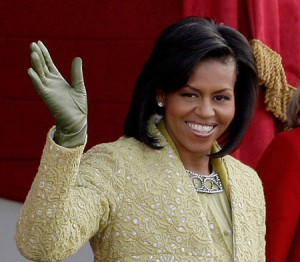
A post on WQXR reports that First Lady Michelle Obama will host an event at the White House on Friday to advocate extra-curricular arts programs. The event will feature world class musicians Joshua Bell, Sharon Isbin, Awadagin Pratt, and Alisa Weilerstein, all of whom will teach 120 middle and high school students from around the country. Following their seminars, the musicians will give a recital in the White House’s East Room. The concert will be attended by the students and guests, as well as the First Family.
Source: WQXR.
New Jersey Symphony Orchestra Gets New Maestro
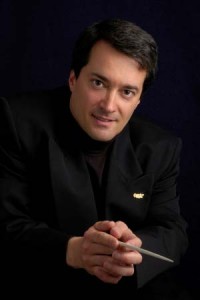
The New Jersey Symphony Orchestra announced that Jacques Lacombe will succeed Neeme Järvi as music director. The 46 year old French Canadian is joining the organization during a period of frozen wages and a reduced concert schedule with the intent of revitalizing both orchestra and audience.
Lacombe says that in order to invigorate the classical scene a conductor must be inventive with his programming. While his preferences lean towards 19th century repertoire with 20th century classics, Lacombe remains fluid with his vision, saying that he doesn’t “want to be labeled,” and that he is still “discovering things.”
While the Ledger regards Lacombe as “untested,” he has many conducting credits including the Met. Where Jäarvi brought experience and renown, Lacombe will hopefully bring new energy and perspective.
Source: The Star Ledger
Aaron Rosand Says Goodbye to His Guarneri
Here’s Lookin at You Kid
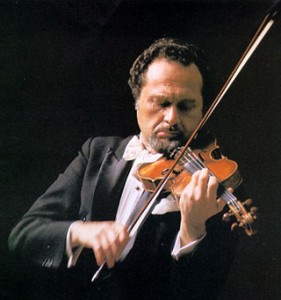
Violinist Aaron Rosand relinquished his violin in a London hotel last week after more than half a century with the instrument. Rosand sold the instrument because he “had” to; he wanted to ensure it will be played as he approaches his golden years—a contingency to which the Russian billionaire who bought the violin agreed.
Rosand says parting with the instrument “felt as if I left part of my body behind.” The Guarneri del Gesu was made in 1741, and previously belonged to violinist Paul Kochanski, earning it the nickname “ex-Kochanski.” Rosand spent his career with that violin, and says he sold it to make sure it continued to see the hands of capable violinists.
Although his performing days are waning, Rosand is staying involved with the arts—particularly his Alma Mater, The Curtis Institute of Music. Mr. Rosand has already donated $1.5 million to the conservatory after the sale, and intends to continue giving. The price tag of his instrument: $10 million.
Source: NY Times.
Newsweek: Classical Music’s Version of Dodgers vs. Yankees: A Youthquake Hits Both Coasts
California Remains Attached
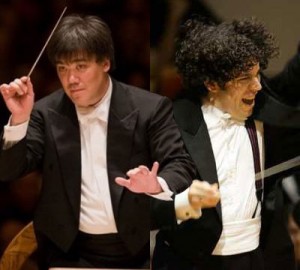
Before the Dodgers relinquished their chance at the Series, Newsweek featured an article capitalizing on the potential bi-coastal competition and profiled the two conductors who recently claimed their coasts: Alan Gilbert and Gustavo Dudamel. Author Seth Colter Walls asserts that the LA and NY Philharmonics are not in competition, but instead share the goal of bringing conductors’ names into American—even international—homes.
Citing that both conductors have already commissioned and premiered works by well known composers, Walls indicates the pair intend to, and are capable of renewing interest in new music and bringing young audiences to concert halls. Click to read the Newsweek article containing the words “buttress” and “contemporaneity.”
The New Yorker: Why So Serious?
Let’s Put a Smile on that Face
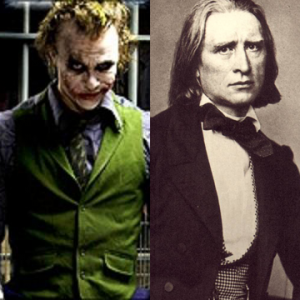
While concertgoers today might resent those who unknowingly applaud or whisper between movements of a piece, it seems such gaffes have only recently begun to draw frowns. The familiar silent audience who applauds in appropriate places is of relatively new invention. Relative, of course, to the age of music in the classical repertoire. As it turns out, classical concerts used to be noisy, social gatherings where aristocrats could mingle and the public could turn bourgeois into a verb.
The September 8th issue of The New Yorker featured the article “Why So Serious?” In it, writer Alex Ross chronicles the history of classical concert tradition.
Ross cites examples from performances at the Paris Opera and recitals by the pianist credited with creating modern piano performance tradition, Franz Liszt. Ross compares Liszt’s recitals to “The Ed Sullivan Show,” claiming that Liszt would solicit suggestions from the audience for subjects to improvise at the piano. Furthermore, Liszt is said to have modulated not only between tonal centers, but entire pieces. As Ross explains it:
View Full Article »
Guest Article: Just Press “Enter”: Technology and the Percussionist
Written by Daniel Cathey
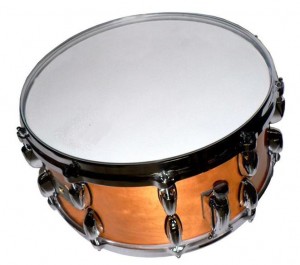
I walk into my office to a large stack of music on my desk, and my stomach turns over as I anticipate a collection of outlandish instrument requests by the composer. I can’t help but chuckle as I read down the list: propeller engine, guillotine sound, the bay of a Central American burro (alright, I made the last one up). Composers’ demands are getting stranger and stranger.
It comes with the job. Finding these instruments—or at the very least, a way to imitate the required sound—should be a challenge. These days, with all the wonderful technology available, it can be as simple as finding the correct sound effect or synthesized instrument on the Internet and playing it through a computer hooked up to an amp (this strategy proves useful when playing Harry Partch’s music). It’s a quick fix, but does it too often take some of the artistry out of what we do?
View Full Article »





